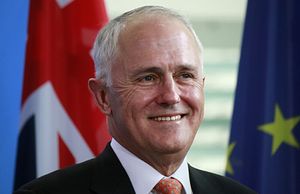The face of Australia’s political leadership will look very different in the near future, as three of Prime Minister Malcolm Turnbull’s ministers have been caught up in scandals.
Human Services Minister Stuart Robert is under fire for a “private” trip he took to China in August 2014. Robert is accused of using his position then to help Paul Marks, Robert’s friend and a significant Liberal Party donor, secure a business deal with a state-owned Chinese outfit over the course of a privately-funded trip to China he took during his leave. Robert denies having used his position to promote the business arrangement and insists he upheld ministerial standards, yet has failed to explain why he was at the contract signing ceremony or featured prominently in commemorative photos. A Chinese website reported that Robert made official statements supporting the deal, and spoke to at least one Chinese official regarding the deal between Nimrod Resources and China MinMetals. Labor has been doing their best to turn this misdemeanor into a larger political issue, and today Turnbull responded by removing Roberts from the ministry.
This relentless pressure on Turnbull over Robert’s alleged misconduct follows closely on the sacking of former Cities Minister Jamie Briggs (due to a scandal in Hong Kong) and the suspension of junior defense minister Mal Brough (over police inquiries into records taken from former Speaker Peter Slipper’s office).
Unlike the other three ministers, Trade Minister Andrew Robb is leaving of his own volition – and with his outstanding record untarnished. On Thursday, Robb announced his upcoming retirement, saying he would not run in the next election, though he will maintain his portfolio until then. Robb has been lauded as one of the most successful trade ministers in history; Turnbull praised Robb as having “put in place some of the most important building blocks for our future” including trade deals with Japan, South Korea, and China. Robb also played a pivotal role in Australia’s negotiations in the Trans-Pacific Partnership (TPP).
Who will replace Robb after the election? Georgina Downer, daughter of former foreign minister Alexander Downer, and Tim Wilson, Human Rights Commissioner, are competing against each other and several other contenders for preselection to the safe seat of Goldstein in Melbourne. Robb appears to have a preference for Downer, a lawyer-turned-diplomat who has served in Australia’s embassy in Japan for four years.
There are also upcoming changes in the leadership of the Nationals, the junior party in Australia’s ruling coalition. Party leader and Deputy Prime Minister Warren Truss announced on Thursday that he would be leaving Parliament. Barnaby Joyce, agriculture minister, took over the position of deputy prime minister unopposed, and Fiona Nash is the new deputy leader of the Nationals. Nash is Minister for Rural Health and will be elevated to the Cabinet. With Fiona’s election, she became the first woman to join the Nationals’ leadership, and now, all four major Australian political parties have female deputies.
Truss’s retirement also means that the infrastructure portfolio will have to be filled. In the upcoming Cabinet reshuffle, the number of Nationals will be increased from three to four. Keep an eye on what portfolio Joyce will request – Nationals generally like to control trade, transport, and agriculture.
It will be interesting to see how Joyce’s elevation to this position of “awesome responsibility” will change the dynamics of Australia’s domestic politics – while Joyce and the Nationals focus on the concerns of regional Australia, Turnbull is considered more of an urbanite. As the Sydney Morning Herald put it, “[Joyce’s] partnership with Turnbull is expected to draw attention as much for their philosophical differences as their areas of agreement.” For example, Joyce criticized Turnbull’s pro-emissions trading policy in 2009. Furthermore, Turnbull is more pro free trade, while Joyce is protectionist, and Turnbull is more socially progressive, while Joyce is conservative. But Joyce might not hold on to his position for long, if Tony Windsor, a popular local politician, chooses to run against him as an independent in the upcoming election.
Even though Labor politicians have tried to make the need for a reshuffle a referendum on Turnbull’s leadership, and a reshuffling so soon into a nascent premiership might be odd, it is difficult to characterize this as particularly atypical – especially given the context in which Turnbull came to power. Alan Tidwell, director for the Center for Australian, New Zealand and Pacific Studies at Georgetown University, explains, “Turnbull’s cabinet problems are not of his making, but rather the stained inheritance from his predecessor.”
The Sydney Morning Herald expects the reshuffle to be unveiled on Sunday. Turnbull will not only have to consider the qualifications and suitability of each individual to each position, but also have to take into account the regional-metropolitan balance as well as gender equity of his Cabinet as a whole.
But for now, Turnbull and the coalition’s focus is on the upcoming election. “Once [Turnbull] has that behind him, he will be able to put his own stamp on things. So, the shake out of the cabinet, through whatever means, is ridding Turnbull of either strong Abbott supporters or those who saw the world in less Turnbull-esque ways, the one exception being Joyce from the Nationals,” Tidwell says.

































